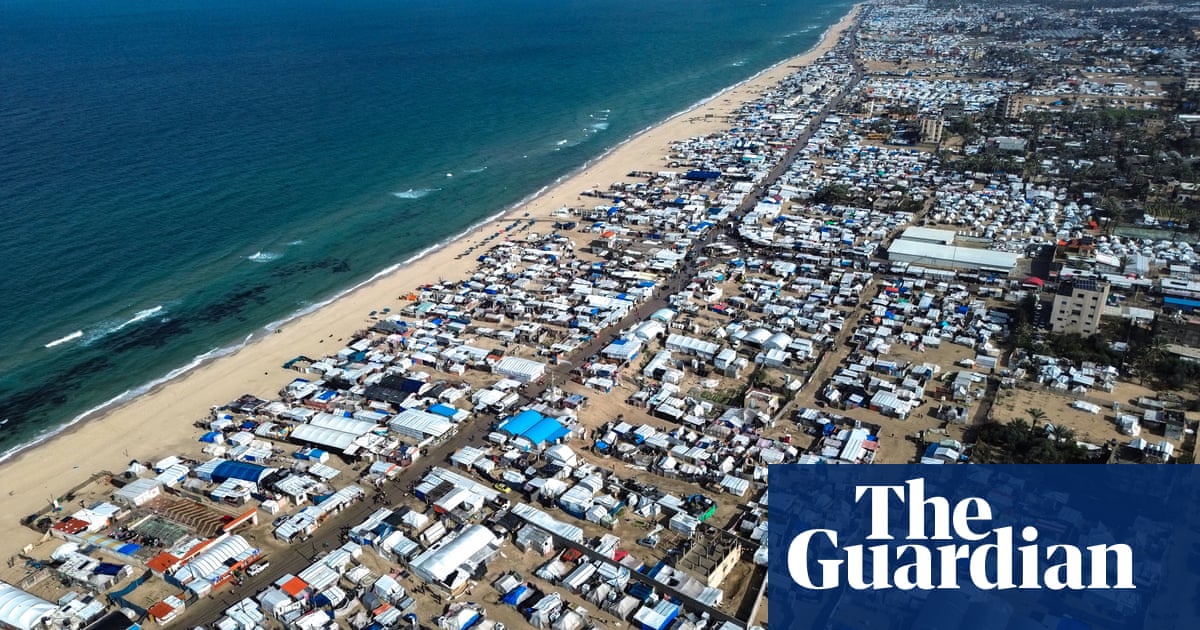Good morning. Donald Trump’s suggestion that Palestinians should be forced out of Gaza so that it could be rebuilt as a US-run “Riviera of the Middle East” is so outlandish that many have returned to the reminder that we should beware of taking what he says too literally. And, it’s true, the comments don’t seem as if they came on the back of a detailed feasibility study; White House officials spent much of yesterday trying to walk his comments back.
But it’s also true that his proposal, which if enacted would amount to an unambiguous case of ethnic cleansing, tells us something about who Trump understands to be the stakeholders in Gaza’s future: not Palestinian civilians, but the United States, Israel, and the contractors who could make it happen. And the idea has so delighted the Israeli right that it is easy to see how, even if no American soldier ever sets foot in Gaza, it creates the space for serious discussion of the same project by other means.
For today’s newsletter, I spoke to Eyal Weizman, the founder of the research group Forensic Architecture and author of Hollow Land: Israel’s Architecture of Occupation, about the long history that informs Trump’s intervention, whether he knows it or not – and what it tells us about Gaza’s future. Here are the headlines.
Five big stories
-
UK economy | Bank of England policymakers are poised to cut interest rates and downgrade forecasts for economic growth, underlining the risks facing Rachel Reeves’s budget plans. With inflation falling, the Bank’s monetary policy committee is expected to cut rates by a quarter point to 4.5% – the lowest level since June 2023 – on Thursday.
-
Democratic Republic of the Congo | Hundreds of women were raped and burned alive after a Rwandan-backed rebel group entered the Congolese city of Goma last week. The female inmates were attacked in their wing inside Goma’s Munzenze prison during a mass jailbreak, according to a senior UN official.
-
Energy | Keir Starmer will unveil plans for a historic expansion in nuclear power across England and Wales, pledging to use Labour’s large majority to make new sites across the country available for new power stations. The prime minister said that he anticipated small modular reactors could be built by 2032 and could become commonplace across Britain.
-
UK news | The families of Valdo Calocane’s victims have called for doctors responsible for his treatment to be named and held accountable. The intervention followed the publication of a report detailing Calocane’s mental health treatment before the attacks in Nottingham in 2023.
-
Media | A high court judge has criticised lawyers representing Noel Clarke for “unacceptable” allegations against Guardian journalists which “should not have been made and publicly aired without foundation”. Mrs Justice Steyn dismissed claims there had been any fabrication of evidence by them and said any deletion of documents was “not in breach of any rule or duty” to preserve them.
In depth: ‘To erase Gaza is a way to continue the work of destruction by construction’
After Donald Trump had finished talking about his concept for Gaza at the White House on Tuesday, Benjamin Netanyahu looked delighted. Trump was willing to “think outside the box with fresh ideas”, he said. “You see things others refuse to see. You say things others refuse to say.”
But while American control of Gaza would be unprecedented, Trump’s proposals are, in other ways, extremely conventional – above all in the attempt to use construction to reshape political reality. “There are many examples of this thinking both in Gaza and beyond it,” Eyal Weizman said. “Trump is not only thinking well within the box on Israel’s policy in relation to refugees in Gaza – but also within the box of settler colonial practices.”
His intervention should also be understood in the context of the growing consensus that a genocide is underway in Gaza, Weizman said. “There’s a clause in the genocide convention that is particularly architectural: ‘Deliberately inflicting on the group conditions of life calculated to bring about its physical destruction’. Violence is applied to the environment because the environment is what maintains life – and so the killing is indirect. To simply erase Gaza and turn it into a riviera is a way to continue the work of destruction by construction, instead.”
The historical precedents
One of the weirdest features of Trump’s second term has been his embrace of a series of eccentric causes that have a distinctly colonial and expansionist flavour. From his threat to cut funding to South Africa over Elon Musk’s claims that white farmers there are the victims of “openly racist ownership laws” to Canada, Greenland and the Panama canal, “these are the type of politics you’d expect of the British empire in the 19th century,” Weizman said.
You can see similar precedents to the Gaza plan. In Kenya during the 1920s, the British colonial administration demolished “African villages” in and around Nairobi as part of an effort to segregate the city on racial lines, and only allowed locals to live there as registered labourers in low-quality public housing. In Algiers in the 1840s, the French army was only able to subjugate guerrilla resistance by razing entire neighbourhoods, organising the city around new roads and markets instead.
“There is a long historical relationship between counterinsurgency and architecture,” Weizman said. “It rests on the idea that architecture can ‘solve’ a political problem and change one’s identity.”
In Gaza, the very fact that so much of the territory is given over to refugee camps is often considered to be the source of the problem. “The refugee camp is viewed not only as the location of the insurgency, but the condition that breeds it,” Weizman said. “A camp is conceived as temporary – it is not a city. It holds within it the idea that someone there is a refugee, who has a right of return. And so the thinking is to turn someone who is a refugee into an urban dweller.”
Versions of that idea in Gaza can be dated back to the 1950s and a plan to resettle tens of thousands of Palestinians to the Sinai desert. “There were grandiose designs of a water canal from the Nile to northern Sinai with a string of villages and towns along it where Palestinians would live,” Weizman said. “But the Palestinians understood that if they left Palestine to go there they could forget about right of return.” The resulting uprising put an end to the project.
The vision of the future
Hong Kong. Singapore. Monaco. Dubai. Even NEOM, the $1.5tn city that Saudi Arabia is attempting to build from scratch on the Red Sea. At some point or other, all of these places have been floated as models for what Gaza should look like.
Trump’s idea that Gaza should be reconfigured as the “riviera of the Middle East” goes a step further. It even exceeds the proposal from his son-in-law Jared Kushner – who said last year that Israel should “clean up” the strip because “Gaza’s waterfront property could be very valuable”, but stopped short of saying that residents should be permanently resettled elsewhere. But Trump’s theory also makes literal something that is implicit in all of these proposals: that Gaza should be deracinated, and modelled on one of those strange 21st-century places that seem untethered from their physical location.
This kind of thinking is part of the “colonial imaginary”, Weizman said – the fantasies and narratives that occupying forces project onto others to justify their control. “They are all enclaves,” he said. “These are places which are jurisdictional or legal islands, places where you can believe you can ignite an economy through suspension of regulations. And, of course, Gaza’s weather and environment is not unlike Florida’s, and Trump’s imagination is also that of a real estate person.” His Middle East envoy, Steve Witkoff, is also a real estate developer.
Dubai and the French Riviera have something else in common, too: they are better known for who goes there than who’s from there. As Trump said at a press conference: there will be jobs “not for a specific group of people, but for everybody”.
In his description of Gaza as “the site” and promise to “get rid of the destroyed buildings, level it out”, he also conjured a vision of a blank canvas – a “demolition site” without specific history or significance.
“We tend to think about Gaza as a concentration area for refugees or as an open-air prison,” Weizman said. “But as my friend the Palestinian filmmaker Basma al-Sarif never tires of reminding me, it is also a place. It is a city along one of the most ancient coastal routes in human culture. The Romans called it the Via Maris, connecting the kingdom of the Euphrates with the kingdom of the Nile. If you dig a few metres under the ground, you find the evidence of thousands of years of continuous habitation.”
The practical reality
Trump gave no specifics of how his idea might become a reality, but if he was trying to do so, he would have to solve a litany of apparently intractable problems: universal regional condemnation outside of Israel; the likelihood that hundreds of thousands of Palestinians in Gaza would resist; the domestic political difficulty of putting American boots on the ground; and a financial burden that Andrew Miller of the Center for American Progress said would “make the $40bn foreign assistance budget that Trump and Elon Musk call a waste look like a rounding error”.
Even if all of those geopolitical problems were somehow resolved, there is the question of the project itself. Even finding the architects would be a vexed process, Weizman said. “The moral nadir of architecture is when design is no longer seen as something to serve people who live in a place on their own terms,” he said. “There is an instinct to go after a project, no matter its origin. I really hope my colleagues would not jump on this.”
None of this is to say that there is a neatly packaged alternative vision for Gaza. “Any plan for the future has to come from Palestinians themselves,” Weizman said. But quite apart from the monumental scale of the task, “there is a dilemma in the fact that two-thirds or more of the people in Gaza are refugees: they’re there because this is where they or their ancestors were expelled to, not where they want to stay. So there is always a need to negotiate between the political right and the humanitarian need.”
after newsletter promotion
What else we’ve been reading
-
Thirty tonnes of rubbish dumped in Lichfield blocked a road and sparked a local whodunnit. Kate McCusker spoke to residents and examines the rise in fly-tipping. Nimo
-
In the latest of Sam Wollaston’s series on people whose lives have been changed by long delays for NHS treatment, The Wait, he tells the devastating story of Jen Bridges-Chalkley, who killed herself at 17 after being denied therapy for years. Her mother, Sharren, says: “She’s not here any more because people didn’t do their job.” Archie
-
This week’s edition of the Long Wave explores the shift away from republicanism in Caribbean countries amid a growing drive for decolonisation. Nimo
-
David Batty has a useful piece giving context to recent reports that Gen Z are keen on authoritarian leaders: among other interesting nuggets is the fact that millennials, too, were far less pro-democracy in their youth – but aged out of the tendency. Archie
-
Could Donald Trump’s 10% tariff on China spell the end of fast fashion giants like Shein? You’d hope so – but not quite. Alaina Demopoulos spoke with experts to find out why. Nimo
Sport
Carabao Cup | Goals in each half secured a 2-0 second-leg win and a 4-0 aggregate victory for Eddie Howe’s Newcastle over a rattled Arsenal side.
Football | Discussions to scrap extra time from Champions League knockout rounds are gathering speed within Uefa in what would be a new step to reduce the number of minutes played by top clubs. The Guardian understands the topic of taking ties in Uefa’s club competitions straight to penalties is being given serious consideration.
Cricket | The owners of Sunrisers Hyderabad are poised to take full ownership of Northern Superchargers, boosting the finances of cash-strapped Yorkshire. The Indian congolmerate Sun Group’s bid put a £100m valuation on the Headingley‑based team.
The front pages
“Trump’s Gaza takeover plan faces global condemnation” says the Guardian, while on the same topic the i has “UK on a collision course with Trump over shock plan to seize Gaza and evict Palestinians”. The Financial Times headlines it “Trump’s takeover proposal for Gaza condemned by US allies across the world”. “‘Failures and cover-ups on an epic level … it’s shameful’” – the Metro covers the Valdo Calocane report, while the Express says “FAILED!”. “Failed by the state” – that’s the Mirror, which equates the Nottingham case with that of Axel Rudakubana, the Southport killer. “Tories to kick out low-paid migrants” is what the Telegraph runs with today and the Mail will have a bit of that too, thanks – “Kemi: I’ll ban migrants who claim benefits from becoming UK citizens”. The top story in the Times is “Social media ‘cancer’ puts children’s lives at risk”.
Today in Focus
Gaza, trade wars and the chaos of Trump diplomacy
The Guardian diplomatic editor, Patrick Wintour, talks through Donald Trump’s latest moves on the world stage, from proposing the US takes over Gaza to starting trade wars with America’s biggest trading partners
Cartoon of the day | Nicola Jennings
The Upside
A bit of good news to remind you that the world’s not all bad
On Venezuela’s coast superstitions warned that women brought bad luck at sea. But as the country faces economic, social, and migration crises, more women than ever are taking up fishing. Documenting this shift is the all-women Solunar collective, who are blending photography, journalism, anthropology, and feminist activism to capture this transformation. In coastal communities, women support each other to survive – like the fisher women of Ocumare de la Costa, who formed Mujeres de la Pesca Ocumare to ensure access to male-owned boats.
The project traces how women moved from weaving nets to casting them, celebrating their resilience and determination. As fisher Doris Duque puts it: “I fish like a woman, not like a man. And my strength is a woman’s, which is just as important.”
Bored at work?
And finally, the Guardian’s puzzles are here to keep you entertained throughout the day. Until tomorrow.
Article by:Source: Archie Bland












